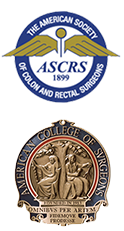Rectal Pain and Rectal Bleeding
Rectal Pain
The majority of patients with anal or rectal pain seen in a colon and rectal surgeon’s office will complain of their hemorrhoids but a careful history and examination by an experienced physician is necessary to make a correct diagnosis. Some patients will have long-standing complaints of pain and/or rectal bleeding that are not attributable to hemorrhoidal disease. Other serious diseases such as anal and colorectal cancer should be ruled out by consultation with a physician knowledgeable in evaluating the anal and rectal area.
Rectal Bleeding
Rectal bleeding can refer to any blood that passes from your anus, although rectal bleeding is usually assumed to refer to bleeding from your lower colon or rectum. Rectal bleeding may show up as blood in your stool, on the toilet paper or in the toilet bowl. As is seen in patients with rectal pain, many will complain of hemorrhoids. Blood that results from rectal bleeding can range in color from bright red to dark maroon to a dark, tarry color. Rectal bleeding may occur for many reasons, including constipation and hemorrhoids, however; other more serious conditions such as anal and colorectal cancer should be evaluated by a Colon & Rectal Surgeon.
What other symptoms should I notice?
- Is the skin around the anal opening warm or red at the center or on the sides?
- Is the anal opening swollen?
- Is the anus moist or dry?
- If there is a mass, it is blue, red or yellow? Is it soft or hard? Is it painful?
- If there is an ulcer (raw area), is it flat, red or with raised edges?
- Is it painful to pass a stool or merely just to sit?
- Does the pain begin after a bout of diarrhea and become worse or constant?
- Is the pain/ bleeding after a constipated stool?
Pain that does not improve after 24-48 hours should be evaluated by a physician. All bleeding should be evaluated by a physician. A colonoscopy may be ordered. Any mass of the anus should be examined by a physician. Skin irritation and infection can be treated with oral medicine and/or creams. A mass can be treated with drainage if it is a blood clot or an abscess. If pain is associated with a fistula it will require surgery. Hemorrhoids can be treated in several ways, often in the office. Fissures may respond to medical treatments or require an operation. In a large number of cases, cancerous tumors of the anus and rectum can be cured by early surgical removal or radiation and chemotherapy. Diagnosis is the first step to feeling better.





